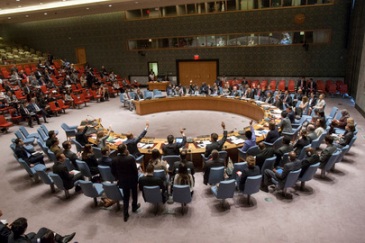UN Security Council discusses renewing sanctions on South Sudan
May 30, 2016 (NEW YORK) – United Nations Security Council (UNSC) is scheduled to discuss renewing and even adding more sanctions on South Sudan in the wake of none or slow progress in the implementation of the Agreement on the Resolution of the Conflict in South Sudan (ARCISS) signed by warring parties in August last year.

This comes after an agreement to pursue the sanctions was reached with Russia on Friday, 27 May, in which the draft resolution followed two technical rollovers (resolution 2280 of 7 April and resolution 2271 of 2 March) that briefly extended the sanctions regime.
The sanction’s renewal was delayed due to the return to Juba of the opposition leader and current First Vice President, Riek Machar, and the formation of the transitional government of national unity in late April.
Some members of the UN Security Council believed that the Council required more time to consider an appropriate approach to sanctions, including a potential arms embargo, while the political situation was in considerable flux and the threat of additional sanctions could affect the calculations of the key decision-makers.
Also members were of the view that the additional time might allow the Council to formulate a more unified strategy, given the divergent views on sanctions. Hence, brief technical rollover resolutions were adopted.
The decision now to pursue an extension of the sanctions regime for a full year appears to reflect the view that an important milestone was achieved with the formation of the transitional government, although there is general recognition that enormous difficulties still lie ahead in the implementation of the peace agreement.
These hurdles include lack of political will by the parties in the transitional government of national unity to resolve on the controversial 28 states which IGAD and UN wanted suspended, but not done up to now.
Others include the non-implementation of most part of the security arrangements and cantonment of forces which was supposed to be done since last year in the pre-transitional period of three months before formation of transitional government.
A new transitional parliament has not yet been reconstituted by the parties, leaving the former parliament of President Salva Kiir’s faction to illegally continue to operate, among others.
However, based on the negotiations of the current text, it is clear that the Council remains divided on the issue of sanctions. The resolution expected to be adopted on Tuesday does not make fundamental changes to the current sanctions regime.
The US, the penholder on South Sudan, circulated the first draft on 18 May, and the first and only round of negotiations among all 15 members was held the following day. Subsequent negotiations were conducted bilaterally. The initial draft was based on the text the Council was negotiating in late February, before it opted to pursue a short technical rollover.
There were a number of areas of disagreement during the negotiations. One controversial issue was the request for a special report from the Panel of Experts. The initial draft proposed that the report focus strictly on the transfers to South Sudan of arms and related materiel, to enable the Council to evaluate the “appropriateness of additional measures.”
Russia, China and Egypt appeared to be uncomfortable with referring to possible “additional measures”, apparently believing that this would prejudice the outcome of the Council’s deliberations in favor of a possible arms embargo.
As a compromise, the US attempted to temper the language in this paragraph; for example, it changed “appropriateness of additional measures” to “appropriate steps.”
However, this formulation was still not acceptable to Russia, one reason why it broke silence. As a compromise, the penholder agreed to delete from the text in blue any reference to follow up, that is ”additional measures” or “appropriate steps” that the Council might take based on the findings of the report.
The Council is also concerned about the ongoing threats in South Sudan to humanitarian organizations and workers as well as non-cooperation with the United Nations Mission in South
Another controversial issue was how to refer to the South Sudan Non-Governmental Organizations Bill, which has been criticised by non-governmental organisations that believe it discriminates against them and inhibits their ability to provide humanitarian assistance to South Sudanese.
The original draft expressed deep concern with this bill, indicating that it could disrupt the operations of international and national non-governmental organisations.
It remains to be seen whether or not the Council members will agree on a measure to take against parties in South Sudan once the deliberations, expected on Tuesday, kick off in New York.
(ST)
